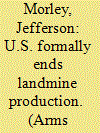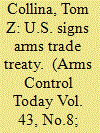|
|
|
Sort Order |
|
|
|
Items / Page
|
|
|
|
|
|
|
| Srl | Item |
| 1 |
ID:
128056


|
|
|
|
|
| Publication |
2013.
|
| Summary/Abstract |
Preventing further use of chemical weapons in Syria will be achieved by their elimination rather than punitive airstrikes. Selective airstrikes, as repeatedly threatened by France, the United Kingdom, and the United States, would not have altered the military situation in the civil war, as the Syrian opposition forces and their backers had hoped.The airstrikes would most certainly not have degraded Syria's chemical weapons capacity to the point it would have become useless, and further chemical attacks would have remained a distinct possibility. Targeting chemical weapons storage sites risked releasing toxic clouds affecting combatants and noncombatants alike. Destroying other types of targets would have just added to the tally of conventional weapons casualties
|
|
|
|
|
|
|
|
|
|
|
|
|
|
|
|
| 2 |
ID:
132784


|
|
|
|
|
| Publication |
2014.
|
| Summary/Abstract |
The U.S. government announced on June 27 that it will not produce or acquire anti-personnel landmines and that it intends to join the global Mine Ban Treaty at some point in the future, a stance that did not satisfy activists and officials pressing to rid the world of landmines.
The U.S. government is "diligently pursuing…solutions that would be compliant" with the treaty and "that would ultimately allow us to accede" to it, Douglas Griffiths, the U.S. ambassador to Mozambique, said in a statement delivered at a review conference for the treaty being held in Maputo. The parties to the treaty, which entered into force in 1999, hold these conferences every five years.
Supporters of the treaty voiced disappointment throughout the conference that the United States has yet to join the treaty, which President Barack Obama endorsed as a U.S. senator in 2007. Although U.S. officials told reporters that their review of U.S. landmine policy, which began five years ago, is not completed, the announced changes fell short of proponents' hopes for U.S. accession to the treaty.
|
|
|
|
|
|
|
|
|
|
|
|
|
|
|
|
| 3 |
ID:
128086


|
|
|
|
|
| Publication |
2013.
|
| Summary/Abstract |
The United States and 17 other countries signed the Arms Trade Treaty (ATT) on Sept. 25, pushing the number of signatories to the pact, which was opened for signature June 3, to 107.
Calling it a significant step toward controlling the illicit trade in conventional weapons, Secretary of State John Kerry signed the treaty on behalf of the United States, the world's largest arms exporter, in a ceremony at the United Nations. "This is about keeping weapons out of the hands of terrorists and rogue actors," Kerry said.
"It's significant that the United States, which [accounts] for about 80 percent of the world's export in arms, has signed," Australian Foreign Minister Julie Bishop told a news conference. In 2012, states engaged in arms transfers totaling more than $85 billion, not including black market transfers, according to the Congressional Research Service.
|
|
|
|
|
|
|
|
|
|
|
|
|
|
|
|
|
|
|
|
|